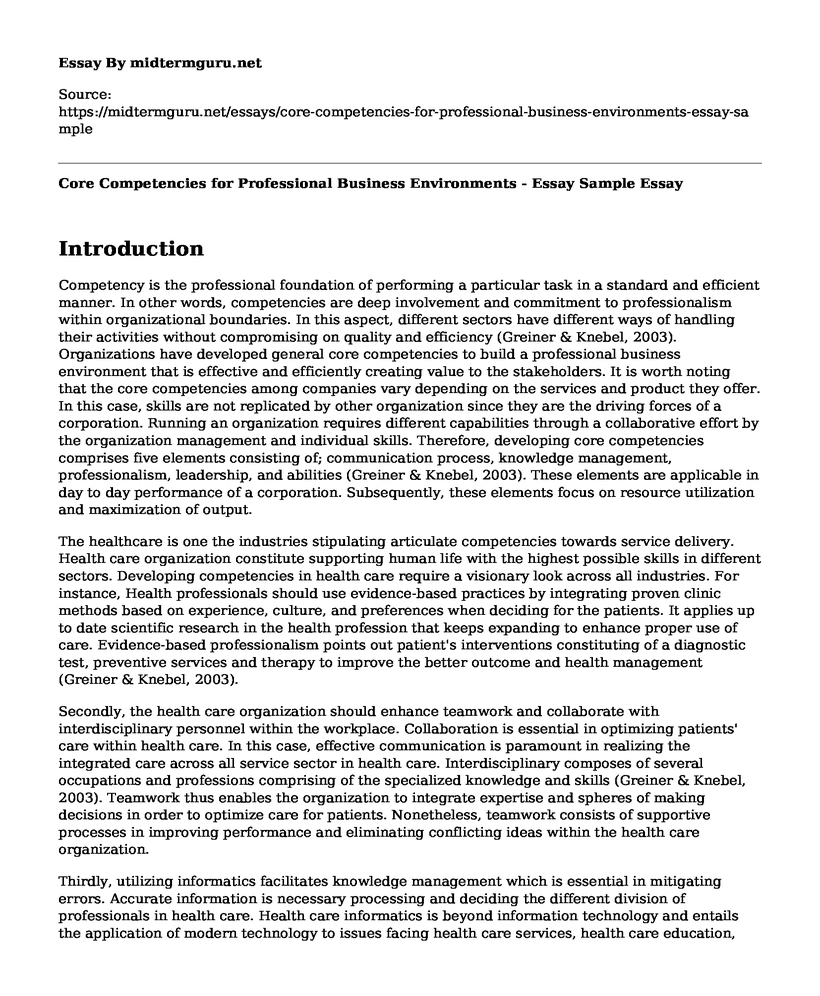Introduction
Competency is the professional foundation of performing a particular task in a standard and efficient manner. In other words, competencies are deep involvement and commitment to professionalism within organizational boundaries. In this aspect, different sectors have different ways of handling their activities without compromising on quality and efficiency (Greiner & Knebel, 2003). Organizations have developed general core competencies to build a professional business environment that is effective and efficiently creating value to the stakeholders. It is worth noting that the core competencies among companies vary depending on the services and product they offer. In this case, skills are not replicated by other organization since they are the driving forces of a corporation. Running an organization requires different capabilities through a collaborative effort by the organization management and individual skills. Therefore, developing core competencies comprises five elements consisting of; communication process, knowledge management, professionalism, leadership, and abilities (Greiner & Knebel, 2003). These elements are applicable in day to day performance of a corporation. Subsequently, these elements focus on resource utilization and maximization of output.
The healthcare is one the industries stipulating articulate competencies towards service delivery. Health care organization constitute supporting human life with the highest possible skills in different sectors. Developing competencies in health care require a visionary look across all industries. For instance, Health professionals should use evidence-based practices by integrating proven clinic methods based on experience, culture, and preferences when deciding for the patients. It applies up to date scientific research in the health profession that keeps expanding to enhance proper use of care. Evidence-based professionalism points out patient's interventions constituting of a diagnostic test, preventive services and therapy to improve the better outcome and health management (Greiner & Knebel, 2003).
Secondly, the health care organization should enhance teamwork and collaborate with interdisciplinary personnel within the workplace. Collaboration is essential in optimizing patients' care within health care. In this case, effective communication is paramount in realizing the integrated care across all service sector in health care. Interdisciplinary composes of several occupations and professions comprising of the specialized knowledge and skills (Greiner & Knebel, 2003). Teamwork thus enables the organization to integrate expertise and spheres of making decisions in order to optimize care for patients. Nonetheless, teamwork consists of supportive processes in improving performance and eliminating conflicting ideas within the health care organization.
Thirdly, utilizing informatics facilitates knowledge management which is essential in mitigating errors. Accurate information is necessary processing and deciding the different division of professionals in health care. Health care informatics is beyond information technology and entails the application of modern technology to issues facing health care services, health care education, and research (Greiner & Knebel, 2003). In this case, implementation of contemporary technology system consists of creating efficiency and effectiveness in the administration of services. In this case, health practitioners should keep up with the evolving health-related information via the internet. Access to past research informatics reduces the chances of errors, knowledge management, effective decisions in health care. Additionally, informatics leads to constant quality improvement thus better patient's management (Greiner & Knebel, 2003). Several sites offer different information regarding health care and the institution alongside its personnel should accommodate this research daily.
Conclusion
In conclusion, health care competencies comprise of critical elements that are professionally standard mechanisms for effective performance. Core competencies play a crucial role in enhancing the operation, efficiency, knowledge management and decision making in an organization. The above three competencies in a health care organization thus lead to better outcomes to the patients and the health care organization.
References
Greiner, A., & Knebel, E. (2003). Health professions education. Washington, D.C.: National Academies Press ISBN-10: 0-309-51678-1.
Cite this page
Core Competencies for Professional Business Environments - Essay Sample. (2023, Jan 10). Retrieved from https://midtermguru.com/essays/core-competencies-for-professional-business-environments-essay-sample
If you are the original author of this essay and no longer wish to have it published on the midtermguru.com website, please click below to request its removal:
- Critique Porters Five Forces Framework - Paper Example
- Causes and Effects of Cancer: Annotated Bibliography
- Risk Factors for Birth Defects: Smoking, Alcohol, Drugs, Nutrition - Research Paper
- Children & Adolescents: The Growing Obesity Challenge Globally - Essay Sample
- Standardized Nursing Language: Enhancing Communication & Care - Essay Sample
- Asthma: A Global Health Threat Affecting 300 Million People - Research Paper
- Creating a Change Management Plan: Lewin's 3-Step Model & Action Research - Essay Sample







